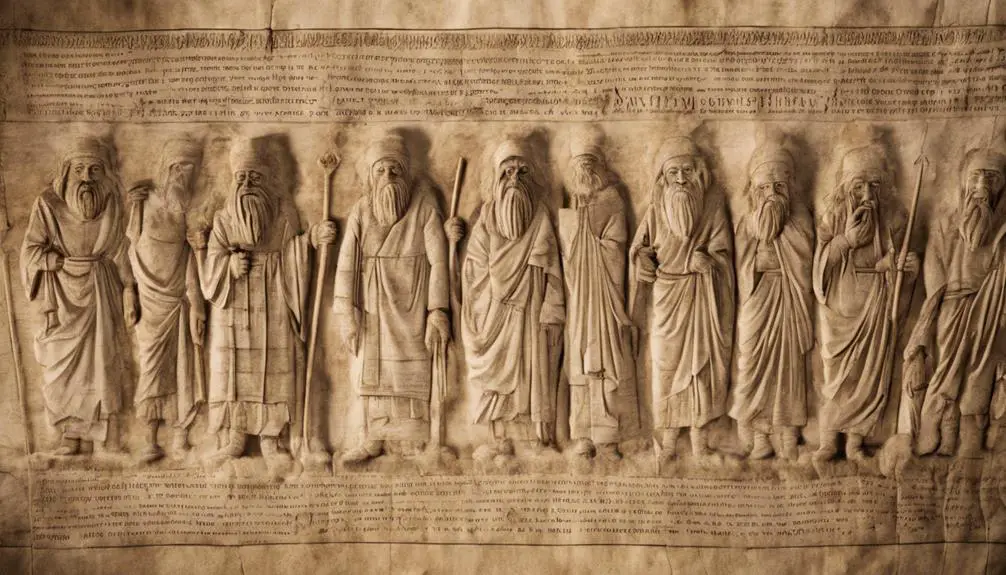Journey through a compelling exploration of skepticism in the Bible, a voyage that promises to deepen your faith and challenge your perceptions.

Skepticism in the Bible
Navigating the sea of the Bible's teachings, you might find yourself battling waves of skepticism. It's only natural to question, as the Bible itself is peppered with instances of doubt and uncertainty.
But have you ever pondered the role of skepticism in your spiritual journey? How might wrestling with these questions actually deepen your faith, rather than erode it?
Let's roll up our sleeves and consider the implications, together, in this thoughtful exploration.
Key Takeaways
- Skepticism in the Bible, expressed through characters' doubts and questions, serves to deepen faith and understanding of divine teachings.
- Biblical figures like Moses, Jeremiah, Paul, and Thomas showcase the role of skepticism in their spiritual journeys and eventual faith strengthening.
- Embracing skepticism can stimulate spiritual growth, encouraging critical thinking, reflection, and a more profound faith.
- Modern interpretations of Biblical skepticism advocate for a critical, analytical engagement with the Bible's teachings, accommodating diverse belief systems and experiences.
Understanding Biblical Skepticism

To fully grasp biblical skepticism, you must delve into the complex interplay of faith, doubt, and critical inquiry that pervades numerous narratives in the Holy Scripture. Here, we'll tackle the origin of skepticism and wrestle with biblical contradictions, shedding light on the intricacies of this fascinating subject.
The skepticism origin is rooted in the very essence of the Bible itself. It's not an external contrivance forced upon the text, but a natural outgrowth of the probing questions that the Bible invites. You're encouraged to delve deeper, to question, to seek understanding. This innate skepticism fuels your faith, not undermines it.
Biblical contradictions, on the other hand, provide fertile ground for skepticism. For instance, you might find different accounts of the same event in various books of the Bible. These inconsistencies can stir up doubt. But it's important to remember that these contradictions don't necessarily invalidate the Bible's authority. They're often a reflection of different perspectives, cultural contexts, and interpretive methods.
Old Testament: Instances of Doubt

Shifting our focus to the Old Testament, you'll notice a number of instances where doubt plays a significant role, revealing the depth and complexity of biblical skepticism.
Take for example the 'Doubt in Prophets'. Prophets like Moses and Jeremiah weren't always confident in their divine missions. Moses doubted his ability to lead the Israelites out of Egypt, questioning his own worthiness and skills. Similarly, Jeremiah expressed uncertainty about his prophetic role, pointing to his youth and lack of eloquence as weaknesses.
Yet, skepticism isn't just confined to the prophets. If we delve into Genesis, we'll encounter skepticism in the story of Sarah, Abraham's wife. When she hears of the prophecy that she'll bear a son in her old age, she laughs in disbelief, demonstrating her own skepticism towards the divine promise.
These instances of doubt and skepticism in the Old Testament serve to humanize these biblical characters, making them more relatable. It also reveals the Bible's recognition of the human tendency to question and doubt, even in the face of divine revelation. This exploration of skepticism in the Old Testament paints a multifaceted picture of faith's complexity.
New Testament: Questioning Faith

Moving into the New Testament, you'll encounter a wealth of instances where faith is questioned, displaying a continued exploration of skepticism within the religious text. Notably, you'll find Paul's doubts and Thomas's unbelief, two prominent figures who question their faith in significant ways.
Paul, originally a fervent persecutor of Christians, underwent a dramatic conversion on the road to Damascus. However, his later writings reveal a man wrestling with his faith. He often questioned the nature of Christ's resurrection, the validity of his own apostleship, and the purpose of suffering. His doubts weren't a rejection of faith but a deepening exploration of it.
Meanwhile, Thomas, one of Jesus's disciples, is famous for his skepticism. After Jesus's resurrection, Thomas refused to believe without tangible proof, saying, 'Unless I see the nail marks in his hands and put my finger where the nails were…I won't believe.' His skepticism isn't a dismissal of faith but a desire for empirical evidence.
In both these instances, you can see a profound questioning of faith, not to reject it, but to understand it more deeply. Their struggles demonstrate that even within the New Testament, faith was never meant to be blind or unexamined.
Skepticism's Role in Spiritual Growth

Drawing from the examples of Paul and Thomas, it's clear that skepticism can serve as a powerful catalyst for spiritual growth. Doubt's influence isn't necessarily a negative aspect of faith. In fact, it often paves Skeptic Pathways, leading you to deeper understanding and greater faith.
Consider this table, presenting three aspects of skepticism and their potential impact on spiritual growth:
Aspect |
Skepticism's Role |
Spiritual Growth |
|---|---|---|
Questioning |
Promotes inquiry |
Deepens faith |
Doubt |
Encourages reflection |
Strengthens belief |
Critical Thinking |
Enhances understanding |
Fosters wisdom |
Questioning, a key aspect of skepticism, promotes inquiry, helping you to deepen your faith. Doubt, too, plays a crucial role. It encourages reflection, ultimately strengthening your belief. Lastly, skepticism's emphasis on critical thinking enhances understanding and fosters wisdom.
Hence, skepticism isn't an enemy of faith, but a tool aiding in spiritual growth. Embracing skepticism enables you to fully engage with your beliefs, refining and solidifying them through rigorous examination. Skepticism, therefore, can be a profound pathway to spiritual enlightenment.
Modern Perspectives on Biblical Skepticism

In looking at modern perspectives on biblical skepticism, you'll find a broad range of views, reflecting the diverse ways that people engage with, interpret, and question religious texts today. Secular interpretations often take a historical-critical approach, scrutinizing the Bible as a product of human culture and history, not as an infallible divine revelation. This perspective allows for a detailed examination of the text's socio-cultural contexts, providing nuanced insights into its meanings.
Cultural influence, on the other hand, has led to a more relativistic approach to biblical skepticism. You'll notice this in the way cultures, particularly in the West, have begun to question traditional religious interpretations, embracing a more individualized, subjective understanding of spirituality. This shift has allowed for more inclusive readings of the Bible, accommodating diverse belief systems and experiences.
However, despite these modern perspectives, the core tenets of biblical skepticism remain: questioning, analyzing, and evaluating the Bible's teachings, its historical accuracy, and its moral relevance. Whether from a secular or cultural perspective, these modern views emphasize a critical engagement with the Bible, pushing you to not just passively accept but actively interrogate its messages.
Frequently Asked Questions
How Does Skepticism in the Bible Relate to Other Religious Texts?
When you delve into skepticism origins in religious texts, you'll find it's not unique to the Bible. A comparative analysis shows similar threads of doubt and questioning in other religious scripts too.
You might find that the questioning nature of humanity transcends religious boundaries, showing up in various forms and narratives across diverse texts.
It's an interesting study, revealing how faith and skepticism often coexist, shaping religious understanding and interpretation.
What Role Does Skepticism Play in Other Spiritual or Religious Traditions?
Skepticism plays vital roles in other religious traditions. In Buddhism, doubt often serves as a pathway to enlightenment, prompting you to question and understand teachings deeply.
Meanwhile, in Hinduism, skepticism promotes philosophical inquiry and encourages you to seek truth beyond apparent realities. These traditions view skepticism not as a challenge, but as a tool for spiritual growth and understanding.
How Can Biblical Skepticism Impact One's Day-To-Day Life?
Biblical skepticism can greatly affect your daily life.
You might question the morality of actions traditionally deemed 'right' or 'wrong' due to skepticism's morality.
Your biblical doubts could make you more analytical, testing beliefs against your own experiences and observations.
This may lead to a shift in your values, influencing your decisions, behavior, and interactions with others.
It can also foster critical thinking, encouraging you to seek evidence before accepting any claim.
How Does Biblical Skepticism Influence Modern Religious Practices?
Your skeptical faith could cause you to question traditional religious practices, potentially leading you to adapt or alter them in ways that align with your personal beliefs. This can also encourage a more analytical approach to faith.
Biblical doubts, meanwhile, can foster deeper exploration and critical thinking in your religious journey. It's a ripple effect – your skepticism influences your personal practices, which can then impact the broader religious community.
Are There Specific Biblical Figures Who Are Known for Their Skeptical Attitudes?
Yes, there are biblical figures known for their skeptical attitudes. Notably, 'Doubting Thomas' springs to mind. His impact is significant as he demanded physical proof of Jesus's resurrection, reflecting a skeptical mindset.
The 'Skeptical Prophets' also questioned their divine visions. They illustrate skepticism within the narrative framework, challenging the status quo and pushing for evidence-based beliefs. Their stories continue to influence modern discussions around faith and doubt.
Conclusion
In examining biblical skepticism, you've traced its presence from the Old to the New Testament. You've seen how questioning faith can act as a catalyst for spiritual growth.
You've also considered modern viewpoints on this issue. Remember, skepticism isn't necessarily negative. It can lead to deeper understanding and stronger faith.
So, don't shun doubt. Instead, use it as a tool to delve deeper into your spiritual journey.



Sign up